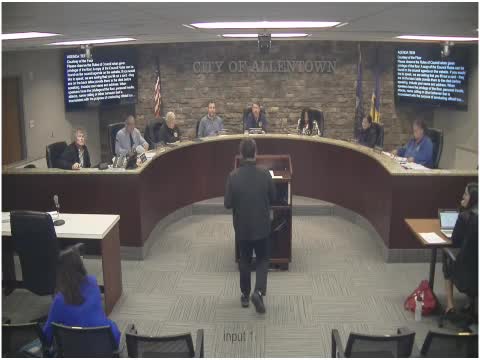Commission on Homelessness urges Allentown council to add dedicated budget line items for unsheltered residents
Get AI-powered insights, summaries, and transcripts
Subscribe
Summary
A co-chair of the city's Commission on Homelessness told council members during public comment the city should create explicit budget line items for hotel funding, sanitation, laundry services and GIS access to better serve people living unsheltered, and cited two imminent encampment clearings along Jordan Creek.
A co-chair of the Allentown Commission on Homelessness urged the City Council during public comment to add specific line items to the 2026 budget to help people living unsheltered.
The speaker told council that a budget “is more than numbers on a spreadsheet” and argued that line items create “transparency, ensure accountability, and allow the city to measure impact over time.” The commission’s requests included emergency hotel funding for medically vulnerable individuals and families with children or pets, homelessness diversion funds for households at imminent risk, portable restrooms and hand- washing/hydration stations near encampments, gift cards to compensate volunteer peer workers, expanded laundry services, and limited access to the city’s GIS for homeless service providers to coordinate outreach.
The speaker said emergency hotel funding is needed because the city currently lacks emergency shelter space suited to medically challenged individuals or families and warned of “heightened health and safety risk” without appropriate shelter. On sanitation, the speaker asked for portable restrooms and hand-washing stations “in multiple wards across the city near encampments,” saying those facilities would reduce disease transmission and environmental impacts.
The commission also urged support for a local nonprofit laundry program, Loads of Blessing, describing it as “the only program in the entire Lehigh Valley” that provides a free completed load of laundry, soap and some connections to resources. The speaker said funding laundry services supports public health and personal dignity.
On data and outreach, the speaker requested that homeless service providers be given access to the city’s GIS so outreach teams and street-medicine providers can locate encampments and respond to changing conditions. The speaker noted two scheduled encampment clearings—one on Nov. 10 and another on Nov. 17—near Jordan Creek and said displacement without coordination can harm health and continuity of care.
The speaker repeatedly framed the requests as near-term, targeted steps rather than long-term solutions, saying the city and regional partners must still develop a one- or two-year plan. The speaker closed by asking council to consider a dedicated budget line as “an act of courage and compassion” and provided contact information for follow-up.
No formal action or commitment by council was recorded during the meeting; the speaker submitted a written handout to council for further review.
